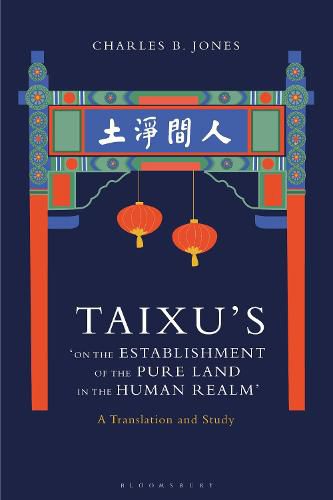Readings Newsletter
Become a Readings Member to make your shopping experience even easier.
Sign in or sign up for free!
You’re not far away from qualifying for FREE standard shipping within Australia
You’ve qualified for FREE standard shipping within Australia
The cart is loading…






In this book, Charles B. Jones provides the first English language translation of one of the most important texts of modern Chinese Buddhism: monk-reformer Taixu’s ‘On the Establishment of the Pure Land in the Human Realm’. The essay, written in 1926 as part of Taixu’s attempt to revive Chinese Buddhism with a Humanistic Buddhist approach, incorporates Western thought into a reconstruction of the idea of the ‘Pure Land in the human realm’. In his commentary on the text, Jones argues that it has been widely misunderstood and mischaracterized.
Jones demonstrates that, besides laying out the very modern idea of the Pure Land in the human realm as a slogan for Buddhist engagement with the problems of the modern world, the essay does not, as commonly assumed, discourage practices leading to rebirth in the Pure Land. He also shows that the ‘human realm’ can mean anywhere in Buddhist cosmology that humans reside, and that the essay’s attempts to reconcile Buddhism with modern science is tentative and incomplete. Jones reveals that the essay promotes visions of both paradises and utopias, and that Taixu supports his ideas with many lengthy sutra quotations. The book concludes with an examination of how Taixu’s followers developed the idea of the Pure Land in the human realm into a more coherent and modernized ideal.
$9.00 standard shipping within Australia
FREE standard shipping within Australia for orders over $100.00
Express & International shipping calculated at checkout
In this book, Charles B. Jones provides the first English language translation of one of the most important texts of modern Chinese Buddhism: monk-reformer Taixu’s ‘On the Establishment of the Pure Land in the Human Realm’. The essay, written in 1926 as part of Taixu’s attempt to revive Chinese Buddhism with a Humanistic Buddhist approach, incorporates Western thought into a reconstruction of the idea of the ‘Pure Land in the human realm’. In his commentary on the text, Jones argues that it has been widely misunderstood and mischaracterized.
Jones demonstrates that, besides laying out the very modern idea of the Pure Land in the human realm as a slogan for Buddhist engagement with the problems of the modern world, the essay does not, as commonly assumed, discourage practices leading to rebirth in the Pure Land. He also shows that the ‘human realm’ can mean anywhere in Buddhist cosmology that humans reside, and that the essay’s attempts to reconcile Buddhism with modern science is tentative and incomplete. Jones reveals that the essay promotes visions of both paradises and utopias, and that Taixu supports his ideas with many lengthy sutra quotations. The book concludes with an examination of how Taixu’s followers developed the idea of the Pure Land in the human realm into a more coherent and modernized ideal.